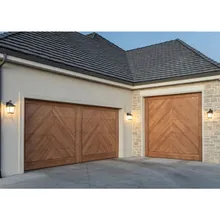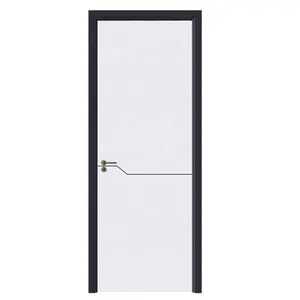An office door is a physical barrier that separates a workspace or office area from other areas of a building. It typically consists of a solid panel or set of panels that can be opened or closed to provide privacy, security, and noise reduction. Office doors also have features such as locks, windows, or transparent sections to allow for visibility.
The types of office doors
There are many types of office doors due to different materials. Glass office doors provide a clear view of the interior and exterior of an office space, which can create a sense of openness and transparency. Besides, glass office doors allow natural light to flow into the office, enhancing the overall brightness and reducing the need for artificial lighting during the day. They can also add a modern and aesthetically pleasing touch to an office space, giving it a sleek and professional look. Wood doors are known for their strength and durability, making them resistant to wear and tear and ensuring longevity. As for metal office doors, they offer a high level of security due to their strength and resistance to external forces, making them suitable for offices requiring enhanced protection. What's more, metal office doors are often fire-rated, providing a certain level of fire resistance, which can be crucial for safety compliance in commercial buildings.
The function of an office door
There are several functions of an office door. Firstly, commercial office doors are essential when someone needs privacy for meetings, confidential conversations, or focused work. They create a physical barrier that allows for concentration and confidentiality. For offices that handle sensitive or confidential information, having a door can help ensure the security and privacy of documents, data, and discussions. Secondly, an office door can help minimize distractions from surrounding noise or activities, allowing employees to work without interruptions. When there is a need for serious discussions, such as performance evaluations, disciplinary actions, or sensitive matters, an office door can provide a designated space.
The security of an office door
The security of an office door depends on several factors. Here are some aspects to consider when assessing the security of an office door. 1. Material and construction: A sturdy and solid door made from durable materials can provide better security than flimsy or hollow doors. 2. Lock types: The type of office door locks matters. Deadbolts are commonly used as they provide stronger protection than regular door handle locks. High-security locks, such as electronic or biometric locks, offer advanced features and enhance overall security. 3. Strike plates: Reinforced strike plates help prevent forced entry by adding strength to the doorframe. 4. Additional security measures: peepholes, security viewers, and door chains offer an extra layer of security by allowing occupants to identify and screen visitors. Besides, window film or blinds for office doors with windows can prevent outsiders from seeing inside the office.







































 浙公网安备 33010002000092号
浙公网安备 33010002000092号 浙B2-20120091-4
浙B2-20120091-4